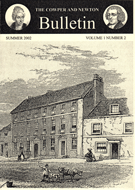Judge Thomas Martin of Pennsylvania has kindly donated the following newly discovered, signed letter by John Newton to the Museum. We do not know to whom it was addressed, as the direction on the verso is covered by the page of a scrapbook into which the previous owner pasted it. We do know however that the recipient was in Scotland. The letter, dated 5 August 1783, shows that Newton, although living in Charles Square, London by this time, was continuing to visit his friends in Olney, particularly Cowper and Mrs Unwin.
He mentions the reprinting of Cardiphonia, a selection of his letters to various correspondents first published in 1781. Cowper had been asked by Newton to come up with a suitable title: ‘Can you compound me a nice Greek word as pretty in sound as Thelyphthora?’ Newton’s sister-in-law Mrs Elizabeth Cunningham (née Catlett) had recently died and her orphaned daughter Eliza, aged 12, came to live with the Newtons. A sickly child, she died in 1785 aged 14. Thomas Snell Jones was Minister of Lady Glenorchy’s Chapel in Edinburgh. Willielma Maxwell, Lady Glenorchy (1741-86), whose name is misspelled in the letter, is the Scottish counterpart of the notable English evangelical gentlewoman, Selina, Countess of Huntingdon. In fact, Dr Jones, the minister she found for her Edinburgh chapel, came from the Countess of Huntingdon’s Connexion; he was ordained minister of the Church of Scotland and served the chapel for 58 years, dying in 1837. The chapel was built in the Nor’ Loch where Waverley Station now stands, and was demolished in 1884 to make way for the railway. (We are indebted to Marylynn Rouse for the information in this paragraph.) Joan McKillop
The following is a transcript of the letter, retaining Newton’s original spellings and contractions. Dear Sir, Had your letter come a post or two later, it must hav[e] waited some time for an answer – for I am just going to visit Olney, & sha[ll be] absent I believe from London till the first week in September. The republication of Cardiphonia must rest a while. I should be glad of a circulation of the books, & should have no objection to money that comes fairly – but I do not think I can give my consent honorably without my bookseller’s concurrence & I must not do evil that good may come of it. We thank you for your kind sympathy on Mrs. Cunningham’s account. But the Lord removed her, & therefore it must be right. I am well satisfied, & Mrs. Newton has been mercifully supported. Her Eliza is a very amiable child. She has taken a fast hold of our hearts – but the worm is at the root of this pleasing gourd likewise – & tho’ she is in many respects better than when she came to us first – her recovery is very doubtful. Indeed the Physicians give little or no hope of it, tho’ life may be prolonged a year or two. But this otherwise shall be as the Lord pleases. There will be none of these trials & crosses, as they are calld, in heaven. We shall be very glad to see you in London. But September or even October will be rather early for your purpose, at least you should not leave town before November. I shall certainly rejoyce to do you every good office in my power – But there are so many building applications continually in hand, & such a general want of money, & so many distressed poor – that it is an unfavorable time for collections, & the line of my connections lies very little among those who contribute much to the building of meeting houses – nor do I usually concern myself at all with such cases, my influence being cheifly employed for the help of the living temples of the Lord. But for you[r] sake I would stretch a point. Do you know Mr. Jones of Lady Glanerhy’s chappel in Edinburg? I believe a letter from him would do you good here. Come & try what can be done. The Lord can give success beyond expectation. All hearts are in his hands. I enclose the receipt for the Cardiphonia’s, which surely if the vessel arrived, ought to have been delivered at Dundee some time ago. I hope to see Wm. Scott in 2 or 3 days, I will deliver your message to him, & if you can write when you return my frank, I will forward the letter to him. Miss Cowie is pretty well & at present with us. We all join in love & best wishes. I am Dear Sir Affectionately yours John Newton 5 August 83 I have only time to write very briefly.

